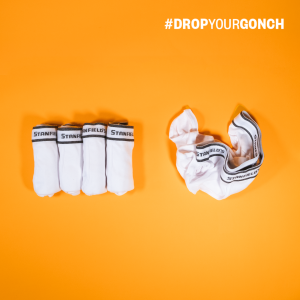June is an important month for Bissell Centre – it’s both Pride Month and National Indigenous History Month. There is a close connection between what Pride Month is all about and Indigenous history in our country.
Countless Indigenous Nations across what’s now called North America saw Two-Spirit Peoples as not only an engrained and normalized part of their culture — Two-Spirit Peoples were often highly regarded and seen as a gift from the Creator.
“They were a very important part of Cree society,” says Elder Ed Lavallee. He is a traditional Plains Nehiyaw (Cree) of the Sturgeon Lake First Nation in Saskatchewan whose career in advocacy for Two-Spirit Peoples has seen him collaborate with groups like Pride Edmonton, the Edmonton Queer History Project, and the Edmonton 2 Spirit Society. Quotes from Elder Ed Lavallee reflect the distinct experience of the Plains Nehiyah Peoples.
“They had many roles in the daily lives of their people and were respected and revered for being Two-Spirited. They were often healers, shamans, mediators in marriage and tribal disputes, keepers of their history and their lore, and taking part and often leading in their social and Spiritual Ceremonies.”
While colonial efforts tried to wipe out any non-conformity from a person’s ascribed gender, the presence of these folks never went away. It wasn’t until 1990 that this way of being was finally given a general English translation to help people across Canada understand that, for countless Indigenous Peoples today, there are far more than only two genders.

The Five Genders
For Indigenous Nations in what’s now called Alberta, there are five genders in the community: male, female, male with female spirit, female with male spirit, and transgender.
“Indigenous people believe that both the female and male spirits reside in the body of a Two-Spirit Individual and the degree of dominance of each spirit ultimately impacts the physical, emotional, mental and spiritual identity of each Two-Spirit person,” says Elder Ed Lavallee.
Rather than trying to change people to better fit with the gender they were born with, Indigenous Nations instead made room for these people and ensured they could contribute to the community with the tasks and skills they identified with most.
Males with female spirits could take on cooking and cleaning duties, were widely seen as gifted artists, and some Nations even saw them adopt orphaned children to take on a caregiver role. Females with male spirits contributed by hunting and being warriors. Some Nations saw females with male spirit folks marrying widowed women.
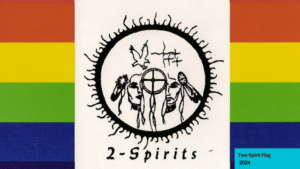
The Reverence for Two Spirit Peoples
In addition to the everyday contributions Two-Spirit Peoples made to their communities, their gift of having two spirits within them also meant they were good healers, medicine people, and visionaries. This is because the two spirits in them give them what’s called double-vision — the ability to see the world through both the male and female lens.
“The belief that Cree Two-Spirit People are special is epitomized in the existence of a powerful Two-Spirit Deity known as Qweskicanskew,” adds Elder Ed Lavallee. “In their spirituality, they believe this Spirit turns things around for the good and well-being of all things on earth. This important Spirit is called upon in prayers for help, protection and blessings.”
Two-Spirit Peoples were foundational to their communities. During colonization, Two-Spirit Peoples’ place in the world seemed to no longer exist. Through the mid- to late-twentieth century, as more Indigenous Peoples began to reclaim their identities, it was clear the different terms used in different Nations like Nádleehí (nad-lay-hee), Winkté (wink-tay), and Niso-acahk-iynew (nee-soh-achak-ee-noo) needed a translation for the wider public to understand.
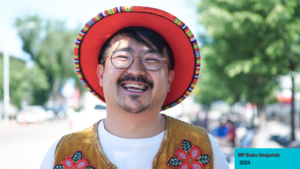
Bringing Two Spirit to the Wider Public
In 1990, at the Third Annual Intertribal Native American, First Nations, Gay and Lesbian American Conference, Elder Myra Laramee put forth the term Two-Spirit. The term is a translation from the Anishnaabemowin (Ojibwe language) term Niizh Manidoowag (neez man-ee-doo-wog). It was added to the front of the Pride acronym (2SLGBTQIA+) in recent years and was even a part of the focus for the Federal 2SLGBTQIA+ Action Plan launched in 2022.
Today, knowledge and understanding about Two-Spirit Peoples is spreading, but is still far behind from where it was before colonization. People like Dr. James Makokis (a Two-Spirit doctor from Kehewin Cree Nation) and MP Blake Desjarlais (a Member of Parliament from Edmonton) are sharing their stories to help more people understand why Two-Spirit Peoples are an essential part of their Nations – and to reduce the stigmatization around people living their authentic lives.
“They are emerging from their long decades of oppression and marginalization working toward re-establishing their rightful roles in their communities as they go through this period of rediscovery,” says Elder Ed Lavalle. “They are working to be recognized, respected and engaged in an integral manner, within Indigenous communities and society in general.”
This Pride Month and National Indigenous History Month, we’re celebrating the bravery of Two-Spirit people coming out and bringing this piece of Indigenous culture to the public forefront. We hope you’ll join us in making room for Peoples who can walk in both worlds to share their gifts and help make this world a more equitable place for everyone.
The role family plays in many Indigenous cultures can’t be understated. Blood familial ties and chosen families can hold the most sacredness and honour for Peoples in Indigenous Nations. The Community at Bissell Centre is no different.
Those strong family ties are especially prevalent at our National Indigenous Peoples’ Day (NIPD) event outside our Community Space (10530 96 Street) every June 21. This is a day of celebration where we block off part of the street, invite performers and artists to share their crafts, and serve some of the best Indigenous cuisine you can find in the city.
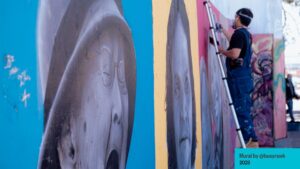
The Reverence held for Elders
Honouring Elders is one of the most important customs of NIPD. The knowledge and teachings these individuals hold in the communities not only preserves the traditional ceremonies and rituals that bring so much vibrancy and life to Indigenous Nations – they can also help guide individuals through challenges and onto the most life-affirming paths.
“One of the most important services we can offer with Bissell’s Indigenous Engagement Program is connecting individuals to Elders,” explains Sarah Higgins, Director of Indigenous Engagement and Integrated Family Services – and a Red River Métis woman. “The teachings and guidance Elders can provide and the connection they foster to Indigenous Nations can help a person decide it’s time to reach out for further supports in their unique journey out of poverty.”
At the NIPD event, you’ll see a tent specifically for Elders to sit in. They’re often accompanied by children from Indigenous Nations, as well, symbolizing how their knowledge will be passed down through generations to ensure the culture and traditions remain a vital part to one’s Indigenous identity.
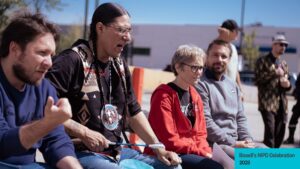
The Crucial Chosen Families Built in the Community
For people accessing the services at Bissell Centre, families by blood aren’t always a part of their lives, yet the importance of family never really goes away for a lot of folks. Creating new chosen families then becomes a part of life in the community.
“It’s not uncommon to see folks in the community calling each other uncle, aunty, or cousin because this is the family they’ve built for themselves,” says Higgins. “Just like a family, these are support systems for each other and we see these connections as real family – just the same as any blood tie.”
Families and communities coming together to celebrate the resiliency of Indigenous Peoples shows how important NIPD is for the folks in downtown Edmonton. And no matter what that family looks like and who makes up that unique family unit, NIPD will have space for all who attend to celebrate the strength, culture, and customs from Indigenous Nations.
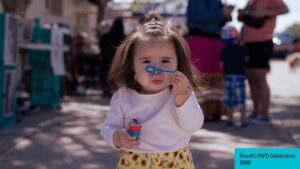
We can’t say enough about our Community Space. This is the central hub where folks can come by for a hot meal, hot shower, fresh clothes, and to build relationships with people to grow their support network.
This space is invaluable to the folks who access its services every day. And, this is why our biggest fundraiser of the year, our Coldest Night of the Year walkathon, sees money raised going directly back into the operations and programs in the Community Space. For a lot of folks, this space is so much more than a warm, indoor place to meet daily necessities – it can also be the first step towards finding their unique pathways out of poverty.
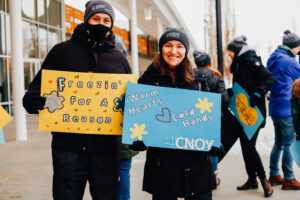
Relationships are everything in the Community Space.
While things like meals and showers might be what first brings people through the doors, they soon learn what other programs might help them along. We offer programs like housing, employment, and mental health, to name a few, which help uncover what barriers people are facing. As staff work to build relationships with people to help find their strengths, folks can start recognizing how best to address these root causes.
No two experiences with houselessness are alike. Building positive relationships can help people recognize their strengths and resiliency – ultimately helping them find their path out of poverty. And, when they’re ready to take those first steps in their journey, Bissell Centre staff help find the resources they need to live a good quality of life.
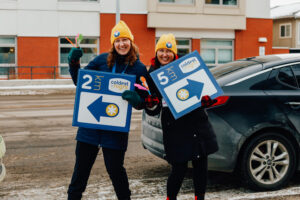
Every journey is unique – and everyone gives back differently.
Doug has been coming to the Community Space for a few years now. In his own words, it’s his home away from home. The relationships he’s built are like family to him. And like any good family, he finds ways to give back.
The main way Doug gives back to the Community Space is by volunteering in the Community Closet, helping folks find new clothes. Other times, Doug walks around the encampments nearby to see if anyone needs any help. Any way that Doug can help, he wants to offer it to the community that’s given him so much.
“If it weren’t for Bissell Centre, I think we’d all be lost,” says Doug. “They’re helping me out, so I want to help them out too.”
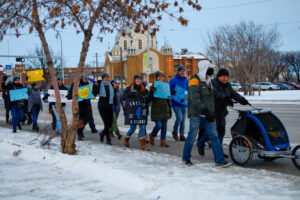
How you can help too.
This year’s Coldest Night of the Year fundraising walk sees all proceeds raised going directly back to the Community Space to support its invaluable operations and programs. Start a team, raise some money, and bring out the whole family for a walk downtown on February 24, 2024. Thank you to all our event sponsors, including our Lead Sponsor Capital Power for providing the single largest sponsorship contribution we have ever received.
When Emcee Construction began renovating our Community Space, it wasn’t necessarily looking to fill in some frontline and entry-level roles on the construction team. But after learning about the Workforce Development program, Construction Manager Corey Wong immediately saw advantages to partnering with this program for recruiting construction workers.
“The process was very easy,” says Wong. “The candidate interviews went very well, and they started right away. Once on-site, they took to the construction environment very quickly.”
Partnering with Workforce Development adds a personalized advantage to recruiting for multiple industries, including construction. We look deeper into each individual’s goals, strengths, talents, and interests to place them in work environments where they will flourish.
Ready to Start Work from Day One
Wong notes that a huge driver for his recruiting through Workforce Development is that candidates are typically already trained and certified – so that’s less time he needs to spend on training and explaining the construction environment.
“Because of the courses taken while in the program, they get a clear idea of what they want to do, and we don’t end up with someone who, once on the job, decides they don’t want to be there, and that’s just lost time for all involved,” says Wong. “The program creates realistic expectations for the worker and, by getting them access to the certifications that will be required by the employer, they then become very attractive as new hires.”
Certifications that program participants gain through Workforce Development can include construction safety, First Aid and CPR, forklift operations, and more. Because the program participants guide much of their own development, they can work on the goals that are relevant to them – giving program workers the opportunity to find and help individuals through their certifications.
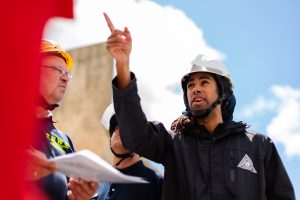
Providing an Opportunity to Excel where it’s Needed Most
On top of all the certifications and other advantages to recruiting construction workers with Workforce Development, Wong fully recognizes how this program helps people not only get back to work – but find work that’s meaningful for them and allows them to excel.
“Because we are a smaller construction company, we have few opportunities for hiring,” says Wong. “To be able to give that opportunity to someone who has in the past struggled to find work, is very gratifying. I remember what it was like when I was young and wanted to get into the construction field with no experience. It can be quite difficult. Our new worker is committed. And once you have good workers you can rely on, you can just concentrate on the work.”
Our Workforce Development program is looking for new employer partners – including ones in the construction, warehousing, and manufacturing industries. Discover how partnering with Workforce Development could help you and your business thrive. Because everyone deserves work that allows them to shine.
To fill his frontline and entry-level positions, LD Filtration’s Vice-President and Partner Dakota Ward typically receives resumes and applications from the usual job websites – but had never received an application from a program like Workforce Development. He explains that after receiving an application from one of the team members on behalf of a program participant, he became interested in what else Bissell Centre’s employment program could offer.
“The team member explained how the program worked and the additional supports from Bissell Centre for the candidate, and how it would assist both the candidate and our company in finding a good fit for our vacancy,” says Ward. “After reviewing the program further and then having a conversation with the team at Workforce Development, we thought it was a win-win for everyone involved, especially helping an individual making life changes and getting back into the workforce.”
Since that first contact with the team, Workforce Development has been a mainstay for Ward and LD Filtration. As a distribution warehouse and manufacturer of filtration products, Ward appreciates the impact the program makes on Edmontonians looking to re-enter the job market.
Trained and Certified with Work in Mind
During the initial portion of the program, participants have the opportunity to pursue relevant training, and Ward more than understands the value of having new team members already trained and certified before they even start. He points to the fork truck operation certification and First Aid/CPR training as incredibly valuable skills that his new hires brought to their first day of work.
“The additional training and certification that candidates receive through this program is incredibly attractive to a recruiter or employer – it surprises me that there aren’t more of these programs out there,” says Ward. “This is a huge advantage as an employer. Training new team members takes time, money and, more often than not, another team member’s time and attention, which short-hands the rest of the crew.”
The training and certification come at no cost to Ward or LD Filtration – and the company is able to save even more money with their new team member’s salary being partially covered by Bissell Centre through a Government of Alberta grant. The additional wraparound services Ward’s newest team member can still access from Bissell further ensures they have everything that they need; so when they come to work, they can put in their best effort.
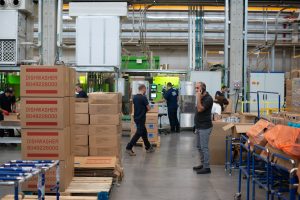
Providing Opportunities to Those Who Need it Most
The best part of partnering with Workforce Development? If you ask Ward, it’s knowing that a new all-star team member who may have not had the opportunity to join the team otherwise now can make an impact with their work. With the myriad of reasons as to why someone might be struggling to find work, Ward knows that all some folks need is their chance to shine and excel.
“If someone in my network asked me my thoughts on it, I would encourage them to push aside any preconceived notions and try out the program – I wish I had sooner,” says Ward. “This program linked us with a great individual who has shown great interest in our company, mission and further career advancement, and we’re very eager to support him through this.”
Our Workforce Development program is looking for new employer partners – including ones in the warehousing, manufacturing, and construction industries. Discover how partnering with Workforce Development could help you and your business thrive. Because everyone deserves work that allows them to shine.
The new Indigenous Engagement program is a spark of connection, igniting a deep sense of belonging through the customs that define Indigenous identities. Together, we remember the past, learn from our ancestors’ wisdom, and embrace it all with open hearts. In this shared journey, we strengthen our bonds and foster understanding.
Guided by the Seven Sacred Teachings: Love, Respect, Courage, Honesty, Wisdom, Humility, and Truth, this program serves as a bridge to Indigenous heritage and a platform for nurturing improved relationships between Indigenous and non-Indigenous communities across Canada.
Launching for National Day for Truth and Reconciliation
“Listening attentively to the voices of our community, we have crafted programs that provide opportunities to connect with Indigenous roots,” says Sarah Higgins, Director of Indigenous Engagement at Bissell Centre. “We focus on celebrating age-old traditions while exploring new ways to honour them.”
The program has been active over 2023 but is officially launching at the end of September – consciously coinciding with National Day for Truth and Reconciliation. Higgins explains how launching this new Indigenous Engagement program at the same time as this important ceremony for Indigenous communities is part of a larger reclamation of Indigenous culture and an important part of the healing that the community needs.
Reclaiming Indigenous Cultural Practices
“We have a large overrepresentation of Indigenous people accessing Bissell Centre programs,” says Higgins. “This program is a direct response to what we were hearing directly from the community. Holding our ceremonies, performing our smudges and our songs, collecting our medicines, and accessing the wisdom of our elders – these are all foundational to what we’re providing in this program.”
She goes on to point out that the ceremonies and customs practiced in the Indigenous Engagement program would have been illegal up until 1951, when the Indian Act was first amended to end its discrimination against Indigenous traditions. Higgins is proud to lead a team that ensures the customs and rituals practiced by Indigenous peoples have a home at Bissell Centre – where they can reach a lot of people who need it most.
Discover more about how the new Indigenous Engagement program by Indigenous folks, for Indigenous folks, is helping more people honour and connect to their culture.
For Sarah Higgins, Director of Indigenous Engagement at Bissell Centre, the word that comes most to mind when she thinks about National Day for Truth and Reconciliation is ceremony. She explains how every Indigenous member of Bissell Centre’s staff and community has a direct correlation to or has been directly impacted by residential schools.
“It’s a way to express our grief and heal from our losses in a healthy and enriching way,” says Higgins. Bissell Centre is holding its own National Day for Truth and Reconciliation ceremony on September 29 from noon to 9:00 p.m. and will feature a pipe ceremony, a Round Dance, and a traditional feast provided by Red Seal Indigenous Chef Matthew Potts.
A History of Indigenous Cultural Ceremonies
While Bissell Centre’s event in downtown Edmonton (10527 96 Street) is open to everyone, it’s far from a celebration. National Day for Truth and Reconciliation was born from the 94 Calls to Action from the Truth and Reconciliation Commission – and after mass graves were found at multiple sites of residential schools across the country. Cultural Support Worker Brandon Lee-McDonald explains how at one point, holding this very event would have landed everyone participating in prison.
“Up until 1951, when the Indian Act was amended, we weren’t allowed to have our drum circles, we had to change the names of our ceremonies, we essentially had to hide in the bushes to express our cultural identity,” says Lee-McDonald. “Our ancestors suffered and died so we could hold our ceremonies in public again. Without their sacrifice, we wouldn’t be able to have this ceremony in downtown Edmonton.”
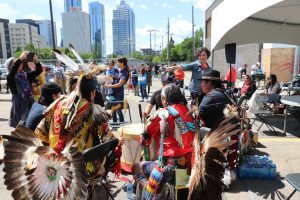
What this Day Means at Bissell Centre
A tenant of the National Truth and Reconciliation event at Bissell Centre is honouring those who survived residential schools. There will be a list of survivors in attendance during the event, to recognize their resilience in the face of an atrocity that took so many.
It might look like we’re celebrating at our National Day for Truth and Reconciliation event, but we’re mourning and grieving,” says Lee-McDonald. “We’re acknowledging the survivors of residential schools and honouring them. This is our day to mourn in a healthy way from our past traumas.”
While everyone at the National Truth and Reconciliation Day event at Bissell Centre will be commemorating that they’re still here, there is still a lot of healing to be done. National Day for Truth and Reconciliation may be about grief and healing, but it’s also about empowerment and reclamation.
“This is a day given to us by the Creator,” says Lee-McDonald. “It was given to help us grieve and heal and be healthy. We want to take this day for our ceremony and live our truths in our cultural identity. It’s a big deal we can hold this ceremony on the streets of Edmonton.”
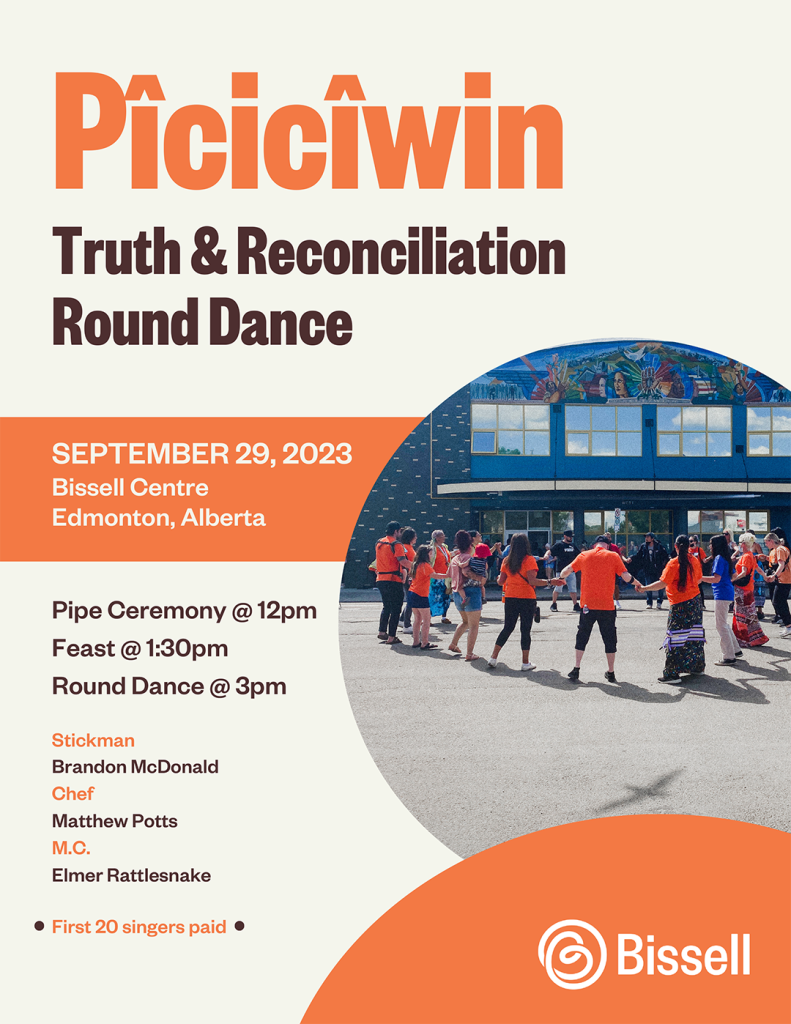
Kari’s eviction notice came swiftly. She had a month to find new accommodations for her and her adult sons with special needs. Unsure how she could find a place on such short notice, Kari considered all her options, from living in a storage unit to even living in her car. Then she remembered a community organization.
“I knew about Bissell Centre—I worked with Bissell Centre while teaching a crafting course,” Kari says. Despite her prior knowledge of the organization, Kari was surprised to learn about the Community Bridge program and how it could help her secure a new home.
As part of the Community Bridge program, Kari was given a $2,000 open-ended, interest-free loan to cover her damage deposit and rent, which she paid back proudly. “I wanted to make sure that resource was there and ready for the next person who needed help.”
A Kokum’s Giving Spirit
This giving spirit is typical for Kari – whose community frequently refers to her as the Community Kokum, or grandmother, providing love, support, and guidance whenever and wherever she can. Even when her pantry was empty and her power shut off, Kari still looked after others and considered her situation manageable.
“I’ve had to flee domestic violence,” says Kari. “While in the shelters, I saw many women in similar situations and how much worse off I could have been. I never saw myself as a victim. I have a lot of resilience that’s helped me through some tough times.”
Prior to reaching out to Community Bridge, Kari faced many uphill battles – especially when it came to where she called home. Kari has moved four times in four years through low-income housing and encountered varying levels of domestic violence and abuse. She’s also struggled with her adult children’s special needs, experienced houselessness while seven months pregnant and underwent multiple medical procedures. Kari tried to push through it without any outside help, but when she needed assistance, she knew Bissell Centre would be there with solutions. However, Kari wasn’t expecting this amount of support from Bissell Centre’s Community Bridge.
“Everything with Community Bridge was no pressure and fell into place seamlessly,” Kari explains. “It took two weeks to learn I had a loan and two weeks after that, I secured my place. I took possession of my new home before I moved out of the last place.”
How Community Bridge Helped Kari
The Community Bridge program is essential to Bissell Centre’s operations. Between April 2022 and March 2023, the Community Bridge program prevented 511 individuals from housing-loss, resulting in 214 households served, with another 202 households assisted with loans. Ensuring people don’t lose their homes and experience houselessness is the team’s top priority – so the first place they look to help folks out is with their current landlords. The team negotiates on behalf of the people they’re helping to prevent any untimely evictions.
When landlords are unable to negotiate any further and eviction is imminent, Community Bridge Support Workers then work directly with the people who need a new place to live, helping make the transition to their new place as seamless as possible.
Partners Make These Programs Possible
A program like this wouldn’t be possible without our partners in the community, like ENMAX. Their support has been crucial for Community Bridge to help people find places to call home.
And as Kari points out, it’s not just finding and funding new spaces that makes this program indispensable – it’s the regular follow-ups and wraparound services that have helped keep her and her family in their new home.
“I think more people should check out Bissell Centre to know what it has to offer,” says Kari. “Without Community Bridge, I would be experiencing houselessness. I never thought I would be in that position. Bissell Centre made sure I still had a place my sons and I could call home.”
Individuals connected to our Fetal Alcohol Spectrum of Services (FASS) program contributed to a book about the challenges and realities of navigating life with Fetal Alcohol Spectrum Disorder (FASD). Under the guidance of Jared Epp, Carleton University PhD candidate and former housing support worker with Bissell Centre, who facilitated the group in sharing stories of what was most important to them. Fifteen people shared their stories, captured in this captivating collection. Born Broken is a book that’s an immersive experience into what it means to have FASD and the barriers it can create.
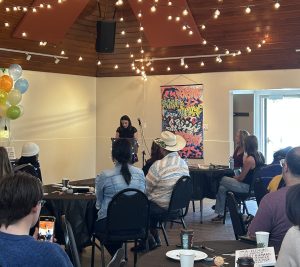
The group celebrated the release of this Born Broken book this past month with a small and intimate reading and sharing. Everyone who contributed to the book received a copy, and a few were shared around the community to help spread its positive message.
Copies of Born Broken books are available to purchase from the Bissell Thrift Shop on 118 Avenue or Paper Birch Books at 10825 95 Street.
Below is the preface to the book, written by Jared Epp. This firsthand experience of seeing the collection come together illuminated the importance of this book for the contributors and for those about to read it and gain a better understanding of FASD.
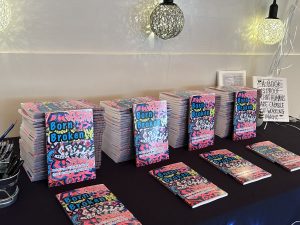
Preface from Born Broken
A group of individuals connected to Bissell Centre’s Fetal Alcohol Spectrum of Services (FASS) came together for a book project. The goal was to provide an opportunity for folks to share whatever kind of content they wanted. Leaving it open-ended allowed the individuals participating in the project to share what was meaningful to them. Their contributions didn’t have to only be about living with Fetal Alcohol Spectrum Disorder (FASD). A number of contributors did want to share their stories about living with FAD, about their daily challenges, as well as the impact of receiving their diagnosis. Others talked about different things. There are stories about adventure on Edmonton’s public transit, sewing denim, dreaming, making music and art, the challenges of finding and keeping a job and many other events and situations the reader will soon encounter.
Woven throughout the book are stories, ideas, frustrations, thoughts and reflections, offering a window into the experience of entering into the world a certain way.
In our last group meeting, we had to come up with a title for the book. Each contributor present was invited to come up with some titles, and then there would be a vote.
These were the title ideas:
- Born Broken
- The Struggle is Real
- Drumbeats of Hope
- Light in the Dark
- Perfectly Imperfect
- Getting Dealt a Bad Hand
Everyone had agreed on Heidi’s subtitle, “Reflections on Life and Resiliency from Individuals living with FASD,” as it put a positive spin on the main title.
Born Broken won by one vote over The Struggle is Real and Light in the Dark. There was a lot of discussion and debate on the chosen title. Some people felt it was too negative, but they also acknowledged it’s sentiment. In many ways, the titles and the debate around it set a theme that echoes through each story: individuals confronting and overcoming something they were born with, have no control over, and yet seems invisible to those outside the lived experience of FASD. The reader is invited to encounter the diverse contributions within the book, keeping in mind the unsettled nature of its title and the realities of living with FASD.
-Jared Epp

Here’s some quick math: If one person had 15,000 pairs of underwear, they could wear a new pair every day for close to 30 years.
At Bissell Centre, we give out 15,000 pairs of new underwear to our Community Members every six months – and the need is still growing.
Underwear isn’t often the first need most people think about when they want to support folks experiencing poverty. Oftentimes, clean underwear makes a huge difference not only in someone’s personal feelings and outlook. It can also help with physical and mental health issues that can be life-changing.

Physical Health Benefits of Clean Underwear
Underwear accumulates a lot of microbes from your body and collects bacteria that can fester without washing. Not only is that an awful odour to try to live in, but it also sticks to the skin and, if left for too long, can lead to infections. It’s even a direct cause of kidney failure and bladder cancer.
Changing into clean underwear is the only way to reduce that risk. If we have no underwear to give out to folks, it’s likely that many more people will be going into emergency rooms and dying from something so easily preventable.

Mental Health Benefits of Clean Underwear
A lot of difference can be made with a little more comfort. A stop by our Community Space includes a hot shower, a meal, some time to do laundry, and a stop by the Community Closet for some fresh clothes. Those four steps are crucial to folks deciding to take the next step and look for help to find their way out of poverty. When you’re working through hard times, fresh underwear is priceless.
This is where we build trust and watch their self-confidence grow. They’re not afraid to talk to people anymore. They’re okay opening up about what their goals look like. Then they start to feel dignity and understand they are worth more than their challenges or their situation. This is when they reach out for help with their mental health, addictions, housing, and employment.
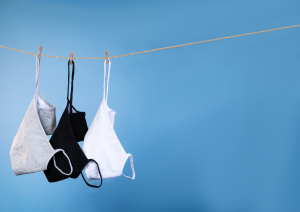
15,000 Pairs of Underwear Donations are Needed
For as long as Bissell Centre has been giving clothes to folks who need them most, underwear has been the single most requested item – but it’s also the least donated. That’s why, each year, we run the Drop Your Gonch campaign. Folks don’t often think about underwear – it’s an embarrassing topic. It’s also an important topic – especially for folks in our community.
Make sure to check out the Drop Your Gonch information page for drop-off locations, donation wish lists, and lists of items we can’t accept.
And think of underwear the next time you get a bag of donations together. Pick up a fresh pair on your way and drop them in the bag. A quick extra step could change a life.
